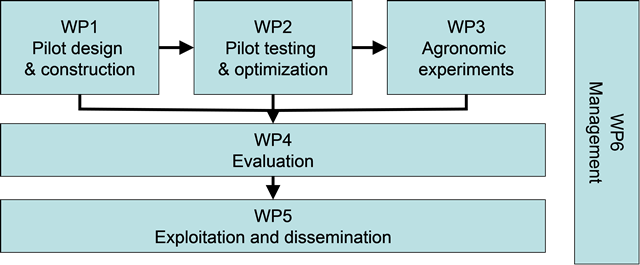C.1 Overall strategy and general description
To achieve the ambitious objectives of AGRISOL, the project has been structured into six work packages as outlined below (see also the project structure in Figure 2)
WP1 Pilot design & construction
Determination of the optimal design for the two pilot solar desalination plants; Construction, installation and commissioning of the two pilot desalination plants; Upgrade of the Israeli pilot solar desalination plant located in Hatzeva.
WP2 Pilot testing & optimization
Identification of different operation strategies (e.g., different recovery rates, recirculation
rates, cleaning cycles, blending rates, membrane fluxes). Detailed planning of timing and duration of the tests to be performed in both pilot plants. Pilot testing and identification of optimal operation strategies.
WP3 Agronomic experiments
Market survey of local agricultural practices, including the identification of locally grown crops and the irrigation rates that are currently applied by the local farmers. Planning and setup of the agronomic experiments, including planning of irrigation rate application, and setup of the necessary equipment. Conducting the agronomic experiments
WP4 Evaluation
Technical evaluation of the proposed technology, including salt retention rates, energy consumption, overall water recovery, analysis of membrane performance over the total operation time, and the need for membranes and other equipment to be replaced.
Full economic analysis of the proposed technology, including a comprehensive cost-benefit analysis taking into account investment costs (from WP1), operation and maintenance costs (from WP2), market values of the produce, and opportunity costs given by the current agricultural practices.
Determination of overall water abstraction with and without desalination; comparison with current practices. Identification of open issues and laying out the principal directions for future research.
WP5 Exploitation and dissemination
Dissemination of the project results to local stakeholders and potential end-users by organizing at least two joint workshops in Israel and Jordan and demonstrations of the technology. Organization of yearly workshops in the West Bank (at least one) and Gaza Strip with the purpose of raising awareness of sustainability issues in agriculture and disseminating the project concepts and results to the local farming communities and other stakeholders (e.g., locally active NGOs). Dissemination of project results to the scientific audience, participation in international conferences, and joint preparation of papers for peer-reviewed international publication. Technology implementation plan
WP6 Management
Coordinate technical management activities implemented through the different work areas by providing support and organizing reporting, including regular risk assessments. Monitoring the overall progress of project organization and of work implementation. Ensuring smooth flow of information between project members and between the consortium and USAID-MERC. Coordinating and managing the contractual and financial aspects of the project. Creating and maintaining internal communication routes (e.g. web-based platform).
 Figure 2. Project PERT diagram
Figure 2. Project PERT diagram